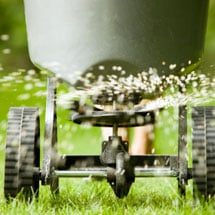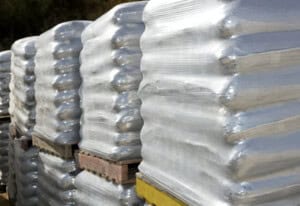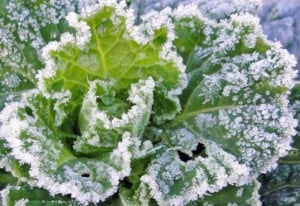Maintaining rich green landscapes, especially during the dry months of summer, can be a challenge. Good organic practice is at the heart of keeping things green and thriving. It requires planning, good soil with proper amendments, and careful mowing and pruning. Here’s a collection of suggestions for keeping your landscaping green all growing season long.
Landscape
Watering your landscape efficiently means both keeping your plants at their best while conserving water. Consider drip irrigation which is shown to be 90% -95% effective in delivering water ( as opposed to 70% for sprinklers). Or try hand watering with a hose or a watering can (use good lifting mechanics), a practice that brings you close to your plants and a great way to spot pests and disease as you water.

HOSES, NOZZLES & SPRINKLERS
Watering Equipment
Make every drop count with our reliable watering tools, hoses and rain barrels.
View allWhen Mother Nature doesn’t deliver, your garden doesn’t have to suffer. We’ve got backup watering equipment and tools that will keep your garden from going thirsty. Let’s grow together!
Plant native and drought tolerant plants. Learn about xeriscape landscaping, which emphasizes sustainable, low-water use plantings.
Choose flowering plants that blossom throughout the summer. Keep color in your garden by planting flowers and other plants with long blooming phases, including impatiens, geraniums, begonias (most of these are especially good in pots). Or choose flowers that bloom during different parts of the summer such as early-blooming peonies and later-blooming bearded iris. Keep flowers, such as black-eyed susans, picked to encourage longer blooming. Mix-and-match plants that bloom at different times of the season. Add small or dwarf evergreen trees and shrubs to keep things green as blossoms fade.
Herbs, many of which originated in dry Mediterranean climate add greenery and blossom color, with out using much water.
Regular additions of compost helps your soil’s water retention capabilities while adding valuable microbes that help plants utilize. Use organic fertilizers as necessary to make sure plants have the macro- and micro-nutrients they need to survive hot dry spells.
Mulch your landscape plants. Mulch helps keep soil cool and retain water. It also encourages worms, microbes and the other organisms that keep soil healthy. As it decays, it adds organic material back to the earth.
Properly prune your shrubs and trees to avoid stress during dry periods. Plants struggle to maintain diseased and competing growth, causing stress to the entire plant while requiring more water. Keep your plants open, airy and untangled.
Lawns
Choose grass types best suited to your growing conditions. Talk to neighbors, nursery people, garden clubs, extension services and sod layers for advice on which grasses do best in your area.
Most cool-weather grasses will naturally go dormant during the driest weeks of summer unless frequently given a thorough watering. Some warm-season grasses such as Bermuda, Zoysia and St. Augustine, keep green and growing all summer (though do go dormant in the winter). These grasses are suitable for temperate areas that don’t suffer hard-freezes. “Cold-hardy” Bermudas, including Tifton 44, extend the growing range of the grass northward (100 miles or so) but still don’t do well in areas with frequent freezes.

SAFE FOR PETS!
Lawn Fertilizers
Safe for people and pets! These slow release fertilizers promote lush, green turf.
View allSlow release, organic lawn fertilizers benefit your soil while providing nutrients for your grass. Not only do they improve soil structure, they encourage beneficial soil microbes that attack pests and diseases. Used in combination with good maintenance practices they will make your lawn less labor and water intensive.
Encourage deep, vigorous root growth. It may be gravity that directs the growth of grass roots, but providing the conditions that stimulate that growth guarantees that you’ll get it. That means mowing to proper height, fertilizing, composting, aerating and, yes, watering. Establishing strong roots saves water and increases drought tolerance.
Cutting grass too short early in the season may be attractive and save you work but it can sap your lawn’s health. Longer spears of grass increase photosynthesis and water retention. Longer grass shades soil, helping to keep it cool, and inhibits germination of weed seed. Cutting grass too short discourages root growth.
Don’t mow cool-season too close, especially as the summer progresses. The popularly held rule-of-thumb says too never cut more than one-third of blade length at any one mowing. Let a lawn that you will cut to three inches grow to four-and-a-half inches before cutting. Keep your mower blades sharp. Cleaner cuts discourage tip browning, disease and moisture loss.
Fertilize. Feed your lawn every four to six weeks. Use an organic fertilizer designed to deliver the nitrogen that grasses need to stay green. Fertilizing your lawn helps insure vigorous, healthy rooting. This allows your grass to make the best use of the water it gets and prevents browning.
A spring application of compost will nourish your lawn’s soil and help to insure good moisture retention. Compost can help smother emerging weeds as well as introduce microbial activity that keeps your soil healthy.
Use a fertilizer, such as Milorganite, that contains iron to boost you lawn’s color. Iron-containing fertilizers are a good, short-term fix for older lawns that need revitalizing but should be used in conjunction with a long-term soil building program that includes compost and other amendments.

Aerate your lawn to avoid soil compaction. Compacted soil encourages thatch to build and water to runoff. Aerating is a form of root prune that stimulates strong growth. Small lawns can be aerated using a manual garden aerator or garden fork, big yards will require renting a power aerator.
If you must water (and in most places you must if you want your grass green through the end of summer), do it effectively.
The amount of water your lawn needs depends on the type of grass you grow and your soil conditions. Many grasses require 1.5 inches of moisture a week, some as much as 2.5 inches. If you don’t water adequately, or if your soil is compacted and has poor moisture retention, your grass will brown despite your efforts.
Measure how much water you’ve put on your lawn by placing open tuna or pet food cans (roughly one and one-quarter inches deep or larger) or soup cans to determine when the desired amount of water has been reached.

PEACE OF MIND
ORGANIC LAWN CARE
Here’s all the products and tools you need to keep your yard healthy and beautiful.
View allBest reasons for organic lawn care? Your children, your pets, you! Chemical-free landscapes give you the peace-of-mind that comes from providing your family a healthy place for outdoor play and gathering.
Make sure the water penetrates soil deeply, at least five inches and more like seven inches (or up to ten) depending on the type of grass in your yard. Use a hori-hori knife, narrow trowel or large flat-head screwdriver to judge how deeply moisture has penetrated. Push it into the soil until you meet resistance, mark the spot on the tool (carefully grabbing it between your thumb and forefinger will do) and remove it.
Sandy soils allow water to penetrate deeply. If your soil is sandy apply less water more frequently, every two or so days, as necessary. Loam soils should be watered every three to five days. Harder, clay soils will require more deep and thorough applications roughly every five to seven days.
If your lawn has a sprinkler irrigation system, make sure it’s set for maximum efficiency. This includes proper run-settings for early or late waterings (even overnight) that are set to proper amounts. Make sure sprinklers heads are set to efficiently cover lawns without wasting water on sidewalks, driveways, or other areas where it’s not needed.
“Syringing” a lawn — applying a light watering to the leaves just before or during the warmest part of the day — can slow browning and root-damage at the soil line. Syringing is also helpful in discouraging the spread of thatch. The University of California offers advice on syringing (PDF) and other good information on watering efficiently.
Follow recommendations for early morning or evening watering to limit sun and wind evaporation. Always keep abreast of local watering restrictions, especially in areas with a history of drought, that may include days, times and frequency of watering or ban it all together.
Why not dispense of the traditional lawn all together? (Answer: your kids and pets need a place to play.) Consider planting native and drought-tolerant grasses or, especially for small areas, consider something entirely outside the box like a thyme lawn.
Have a few ideas of your own? Please add them to comments of check in on our Facebook page. In the meantime, here’s water-wise advice from the fine folks at the Utah State University Extension.











